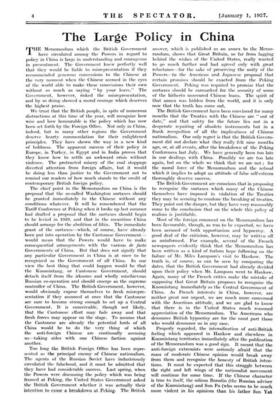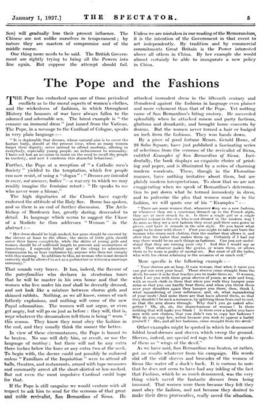The Large Policy in China
THE Memorandum which the British Government have circulated among the Powers in regard to policy in China is large in understanding and courageous in presentment. The Government knew perfectly well that they would be liable to misrepresentation if they recommended generous concessions to the Chinese at the very moment when the Chinese seemed in the eyes of the world able to make these concessions their own without so much as saying " by your leave." The Government, however, risked the misrepresentation, and by so doing showed a moral courage which deserves the highest praise.
We trust that the British people, in spite of numerous distractions at this time of the year, will recognize how wise and how honourable is the policy which has now been set forth by the Foreign Office. Not only in China, indeed, but in many other regions the Government deserve hearty commendation for their enlightened principles. They have shown the way in a new kind of boldness. The apparent success of their policy in Europe, in Turkey, in Egypt and in India proves that they know how to settle an awkward crisis without violence. The protracted misery of the coal stoppage diverted attention from foreign affairs, but it would be doing less than justice to the Government not to remind our readers of how much stands to the credit of contemporary British foreign policy.
The chief point in the Memorandum on China is the proposal that the so-called Washington surtaxes should be granted immediately to the Chinese without any conditions whatever. It will be remembered that the Tariff Conference at Peking when it broke up last summer had drafted a proposal that the surtaxes should begin to be levied in 1929, and that in the meantime China should arrange for the abolition of likin. The immediate grant of the surtaxes—which, of course, have already been put into operation by the Cantonese Government— would mean that the Powers would have to make consequential arrangements with the various de facto Governments of China. But that does not signify that any particular Government in China is at once to be recognized as the Government of all China. In our view the best thing that could happen would be that the Kuomintang, or Cantonese Government, should detach itself from the irksome and wholly mischievous Russian co-operation and should emerge as the supreme controller of China. The British Government, however, would obviously expose themselves to fresh misrepre- sentation if they assumed at once that the Cantonese are sure to become strong enough to set up a Central Government. It is conceivable, though not likely, that the Cantonese effort may fade away and that fresh forces may appear on the stage. To assume that the Cantonese are already the potential lords of all China would be to do the very thing of which the anti-foreign Chinese are continually accusing us—taking sides with one Chinese faction against another.
Too long the British Foreign Office has been repre- sented as the principal enemy of Chinese nationalism. The agents of the Russian Soviet have industriously circulated the falsehood, and it must be admitted that they have had considerable success. Last spring, when the Powers were discussing the policy which was being framed at Peking, the United States Government asked the British Government whether it was actually their intention to cause a breakdown at Peking. The British answer, which is published as an annex to the Memo- randum, shows that Great Britain, so far from lagging behind the wishes of the United States, really wanted to go much further and had agreed only with great reluctance—for the sake of preserving the unity of the Powers—to the American and Japanese proposal that certain promises should be exacted from the Peking Government. Peking was required to promise that the surtaxes should be earmarked for the security of some of the hitherto unsecured Chinese loans. The spirit of that annex was hidden from the world, and it is only now that the truth has come out.
The British Government have been convinced for many months that the Treaties with the Chinese are " out of date," and that safety for the future lies not in a desperate repairing of obsolete instruments but in a frank recognition of all the implications of Chinese nationalism. Our only regret is that the British Govern- ment did not declare what they really felt nine months ago, or, at all events, after the breakdown of the Peking Conferences last July. We have generally been too late in our dealings With China. Possibly we are too late again, but on the whole we think that we arc not ; for the moral force of the Memorandum and the refusal which it implies to adopt an attitude of false self-esteem thoroughly deserve success.
The British Government are conscious that in proposing to recognize the surtaxes which many of the Chinese themselves have imposed in violation of the Treaties they may be seeming to condone the breaking of treaties. They point out the danger, but they have very reasonably come to the conclusion that on the whole this policy of realism is justifiable.
Most of the foreign comment on the Memorandum has been favourable, though, as was to be expected, we have been accused of both opportunism and hypocrisy. A good deal of the criticism, however, may be written off as uninformed. For example, several of the French newspapers evidently think that the Memorandum has been written as a kind of forlorn hope following on the failure of Mr. Miles Lampson's visit to Hankow. The truth is, of course, as can be seen by comparing the dates, that the British Government had already decided upon their policy when Mr. Lampson went to Hankow. Again, many of the French critics make the mistake of supposing that Great Britain proposes to recognize the Kuomintang immediately as the Central Government of China. As French interests in China, however, are neither great nor urgent, we are much more concerned with the American attitude, and we are glad to know that there is in the United States much reasoned appreciation of the Memorandum. The Americans who denounce British hypocrisy are for the most part those who would denounce us in any case.
Properly regarded, the intensification of anti-British feeling which appeared in Hankow and elsewhere in Kuomintang territories immediately after the publication of the Memorandum was a good sign. It meant that the anti-foreign extremists were seriously afraid that the mass of moderate Chinese opinion would break away from them and recognize the honesty of British inten- tions. It must be expected that this struggle between the right and left wings of the nationalist movement will continue for some time. If the Chinese character is true to itself, the odious Borodin (the Russian adviser of the Kuomintang) and Sun Fo (who seems to be mucl . more violent in his opinions than his father Sun Yat Sen) will gradually lose their present influence. The Chinese are not unlike ourselves- in temperament ; by nature they are masters of compromise and of the middle course.
One thing more needs to be said. The British Govern- ment are rightly trying to bring all the Powers into line again. But suppose the attempt should fail. Unless we are mistaken in our reading of the Memorandum, it is the intention of the Government in that event to act independently. By tradition and by commercial commitments Great Britain is the Power interested above all others in China. By her example she would almost certainly he able to inaugurate a new policy in China.



































 Previous page
Previous page